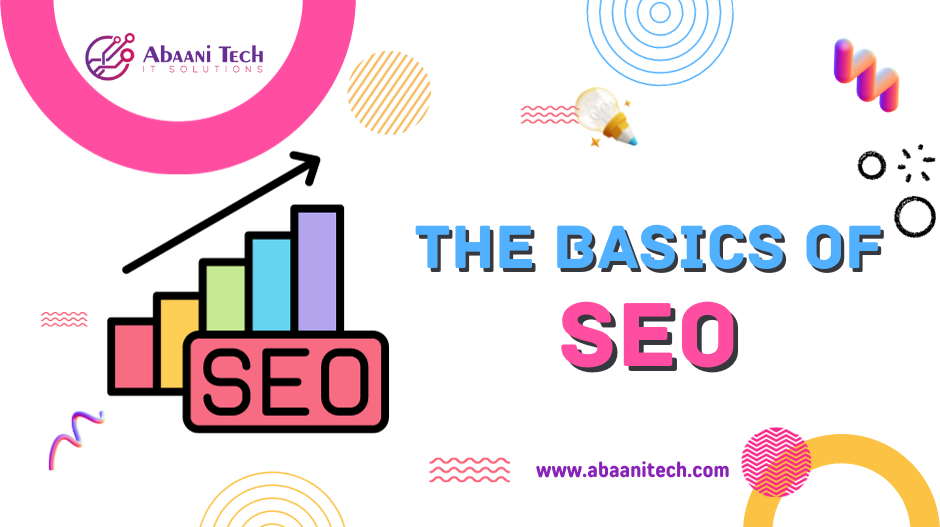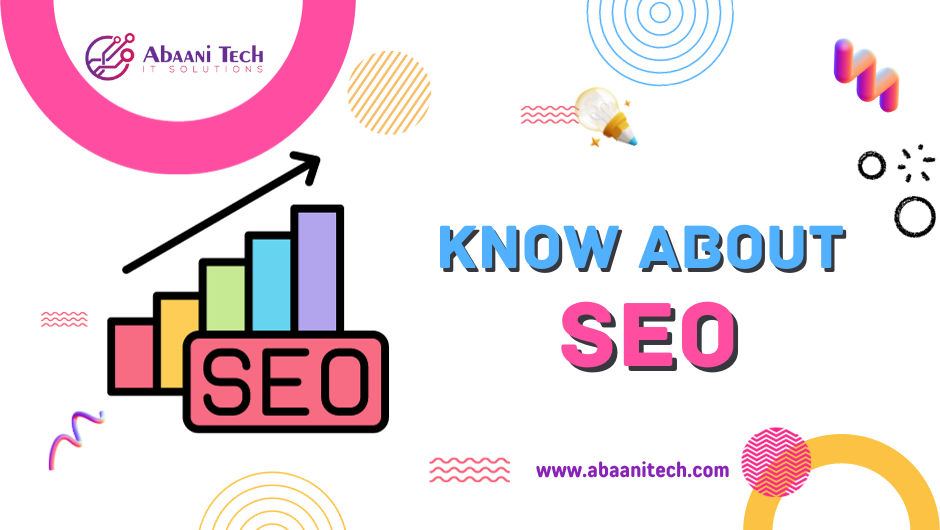The Basics of SEO


The basics of SEO we always need to start for our digital journey. SEO (Search Engine Optimization) is the practice of enhancing a website’s visibility on search engines like Google, Bing, and Yahoo. It’s an indispensable part of any online strategy, as it significantly impacts a website’s organic (non-paid) traffic.
In this article, we’ll delve into the world of SEO, from its fundamental concepts to advanced strategies.
Why SEO is Important
SEO is vital for several reasons. Firstly, it increases a website’s visibility, which in turn drives more organic traffic. This is crucial because users typically click on one of the top results on search engine pages, and if your website isn’t there, you’re missing out. Secondly, SEO helps build trust and credibility.
When your website ranks high, users perceive it as more reliable. Lastly, it’s a cost-effective marketing strategy, as you’re not paying for ad space.
How Search Engines Work
To understand SEO, you need to grasp how search engines work. Search engines use algorithms to crawl, index, and rank websites. These algorithms consider a multitude of factors, such as keywords, content quality, backlinks, and user experience. The goal is to provide users with the most relevant and valuable results.
Here are some major types of SEO you should know before starting your journey.
On-Page SEO
On-Page SEO is a fundamental aspect of optimizing your website for search engines. It involves a series of strategic techniques and practices that are implemented directly on your web pages to enhance their search engine visibility and user experience.
Explore how you can leverage On page SEO to improve your website’s performance and rankings.
1. Optimizing Content
Content is king in the world of SEO. High-quality, relevant, and engaging content is crucial. It should be optimized for keywords without overstuffing, have proper headings, and use multimedia to enhance user experience.
2. Meta Tags and Titles
Meta tags and titles are essential on-page elements that inform search engines about your content. A well-crafted title and meta description can improve click-through rates.
3. URL Structure
An organized and clean URL structure is not only user-friendly but also SEO-friendly. Use descriptive keywords in your URLs to make it easier for search engines to understand your page’s content.
Off-Page SEO
Off-Page SEO is the counterpart to On-Page SEO and plays a crucial role in determining your website’s authority, credibility, and overall ranking on search engine result pages. While On-Page SEO deals with optimizing the content and structure of your website itself, Off-Page SEO is all about what happens beyond your site.


Off-Page SEO focuses on building a strong online presence and reputation through tactics such as link-building, social media engagement, and other external factors.
Explore the significance of Off-Page SEO and how you can effectively utilize it to boost your website’s visibility and credibility in the digital landscape.
1. Backlinks and Their Significance
Backlinks are links from other websites to yours. They are a powerful ranking factor. Quality backlinks indicate to search engines that your content is authoritative and valuable.
2. Social Media Engagement
Social media plays a significant role in off-page SEO. It can help drive traffic to your site and boost your online presence. Sharing your content on social platforms is a great way to engage with your audience.
3. Guest Blogging
Guest blogging involves writing for other websites within your niche. It’s an excellent way to build backlinks and establish authority in your industry.
Technical SEO
Technical SEO, the unsung hero of website optimization, is all about the mechanics that make your site perform flawlessly. From speed enhancements to mobile compatibility, it’s the backbone of online success. Explore the significance of technical SEO to boost your website’s visibility.
1. Website Speed and Performance
Site speed and performance are vital for both user experience and SEO. Slow-loading websites can lead to high bounce rates and lower rankings.
2. Mobile Optimization
As the majority of internet users are on mobile devices, it’s crucial to optimize your site for mobile. Google considers mobile-friendliness when ranking websites.
3. Structured Data Markup
Structured data helps search engines understand your content better, leading to rich snippets in search results.
Local SEO
Local SEO empowers businesses to thrive in their immediate communities. It’s the art of putting your name on the map, both literally and digitally, for local customers to discover. Let’s explore the significance of local SEO.
1. Local Listings and Citations
For businesses with a physical location, local SEO is essential. Claim and optimize your local listings and citations to ensure your business appears in local searches.
2. Google My Business
Google My Business is a free tool that allows businesses to manage their online presence across Google, including Search and Maps.
3. Customer Reviews
Positive reviews not only enhance your reputation but also impact local search rankings. Encourage satisfied customers to leave reviews.
Content Creation and SEO


Content Creation and SEO are like two peas in a pod. Crafting engaging, keyword-rich content is the key to ranking well on search engines. It’s the art of aligning your message with what your audience is searching for, resulting in a win-win for your website and your readers.
Do some important things before starting content creation.
1. Keyword Research
Keyword research is the foundation of SEO. Use tools to identify relevant keywords that users are searching for.
2. Quality and Relevance
Quality content that satisfies user intent is the key to SEO success. Relevance to the search query is crucial.
3. Blogging and SEO
Regular blogging keeps your site fresh and relevant. It’s an excellent way to target long-tail keywords and provide value to your audience.
SEO Tools
In the ever-evolving world of SEO, having the right tools in your arsenal can make all the difference. SEO Tools simplify the process, providing invaluable data and insights to fine-tune your strategy.
From tracking performance to conducting keyword research, they are the compass guiding you through the digital landscape.
- Google Analytics: Google Analytics is a free tool that provides valuable insights into your website’s performance.
- Keyword Research Tools: There are various keyword research tools available to help you find the best keywords for your content.
- SEO Plugins: For platforms like WordPress, SEO plugins simplify on-page optimization.
SEO Trends
SEO Trends are the signposts guiding the ever-changing path of search engine optimization. Staying ahead of these trends is essential for maintaining and improving your website’s performance.
1. Voice Search
The rise of voice-activated devices has led to an increase in voice searches. Optimizing for voice search is a growing trend in SEO.
2. User Experience
User experience is crucial for both SEO and overall website success. A well-designed, user-friendly site is more likely to rank higher.
3. Core Web Vitals
Google considers Core Web Vitals as ranking factors, emphasizing the importance of a seamless user experience.
Measuring SEO Success
Measuring SEO Success is like navigating a ship through uncharted waters. It’s about tracking the right metrics and setting clear goals to ensure you’re on the right course toward digital success.
- Metrics to Track: Metrics like organic traffic, keyword rankings, and conversion rates are key indicators of SEO success.
- Setting Goals: Setting clear and achievable SEO goals is essential for monitoring progress.
- Adjusting Strategies: SEO is dynamic. Regularly adjust your strategies to keep up with algorithm changes and industry trends.
Common SEO Mistakes
Common SEO Mistakes can be costly detours on the road to online success. Avoiding pitfalls like keyword stuffing, ignoring mobile optimization, and neglecting quality content is essential for a smooth SEO journey.
- Keyword Stuffing: Overloading content with keywords can harm your rankings. Aim for a natural and relevant keyword usage.
- Ignoring Mobile Users: Neglecting mobile optimization can result in a significant loss of traffic.
- Neglecting Quality Content: High-quality content is at the heart of SEO. Ignoring this will hinder your success.
SEO for E-commerce


SEO for E-commerce is the compass for online retailers. It involves fine-tuning product pages, utilizing shopping feeds, and implementing e-commerce-specific SEO strategies to ensure your digital store shines in the online marketplace.
1. Product Page Optimization
Optimizing product pages is critical for e-commerce websites. Use high-quality images, detailed descriptions, and user reviews.
2. Shopping Feeds
Leverage shopping feeds to showcase your products on platforms like Google Shopping.
3. E-commerce SEO Tips
Implement best practices for e-commerce SEO, including site structure, product categorization, and schema markup.
International SEO
International SEO is the passport to global audiences. By optimizing your website for various regions and languages, you can expand your reach and capture the attention of a worldwide clientele.
- Targeting Global Audiences
International SEO involves optimizing your site for multiple regions or languages. It’s crucial for businesses with a global audience.
- Multilingual SEO
Optimize your content for multiple languages, using hreflang tags and providing high-quality translations.
SEO and Social Media
SEO and Social Media, the dynamic duo of digital marketing, can supercharge your online presence. Leveraging social platforms, sharing content, and engaging with your audience can significantly boost your SEO efforts.
- Social Signals and SEO
While social signals are not direct ranking factors, they impact your online presence and indirectly influence SEO.
- Social Media Strategies
Leverage social media to promote your content, engage with your audience, and drive traffic to your site.
Conclusion
In conclusion, Search Engine Optimization (SEO) is a complex field that demands continuous commitment and adaptability. When executed correctly, it serves as a long-term strategy that can substantially elevate your online visibility, attract a greater volume of web traffic, and ultimately propel your business toward unprecedented success.
SEO’s capacity to improve your digital presence and drive growth makes it an indispensable tool for any business seeking to thrive in the online landscape.
Read our informative article: Google & Bing Ads: Boosting Your Visibility
FAQs
- What is the most critical aspect of on-page SEO?
The quality and relevance of your content are the most critical aspects of on-page SEO.
- How can I improve my website’s mobile optimization?
To enhance mobile optimization, make sure your website is responsive, and reduce image and code bloat.
- Are backlinks still important for SEO in 2023?
Yes, backlinks remain a crucial factor for SEO success, but their quality is more important than quantity.
- What are some common mistakes to avoid in SEO?
Common mistakes include keyword stuffing, ignoring mobile optimization, and neglecting high-quality content.
- How do I approach international SEO for my business?
International SEO involves targeting global audiences, optimizing for multiple languages, and using hreflang tags to indicate language and regional targeting.






